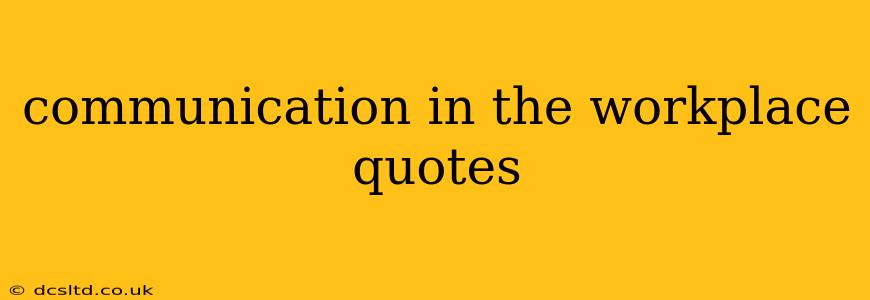Effective communication is the lifeblood of any successful workplace. It fosters collaboration, boosts morale, and drives productivity. Miscommunication, on the other hand, can lead to conflict, errors, and ultimately, failure. This article explores the importance of workplace communication through insightful quotes, examining their meaning and relevance in today's dynamic work environments. We'll also delve into frequently asked questions surrounding communication strategies in the professional world.
The Power of Words: Key Quotes on Workplace Communication
Many brilliant minds have offered profound insights into the art of communication. Here are a few impactful quotes that highlight its critical role in the workplace:
-
"The single biggest problem in communication is the illusion that it has taken place." – George Bernard Shaw: This quote underscores the crucial need for confirmation and feedback. Simply sending a message doesn't guarantee it's been understood correctly. Active listening and seeking clarification are essential components of effective communication.
-
"Listening is a magnetic and creative force." – Frank Tyger: Active listening isn't just about hearing words; it's about understanding the speaker's perspective, emotions, and intentions. This empathetic approach fosters trust and strengthens relationships, leading to more productive collaborations.
-
"Communication works for those who work at it." – John Powell: Effective communication is a skill that requires continuous effort and improvement. It's not something that happens passively; it demands conscious practice, self-awareness, and a commitment to clarity.
Frequently Asked Questions (FAQs) about Workplace Communication
These commonly asked questions further illuminate the challenges and rewards of effective workplace communication:
How can I improve my communication skills in the workplace?
Improving communication skills is an ongoing process. It involves:
- Active Listening: Pay close attention to what others say, both verbally and nonverbally. Ask clarifying questions to ensure understanding.
- Clear and Concise Messaging: Structure your messages logically and use simple language to avoid ambiguity.
- Nonverbal Communication: Be mindful of your body language, tone of voice, and facial expressions as they significantly impact how your message is received.
- Feedback and Open Dialogue: Encourage feedback from colleagues and be open to receiving constructive criticism.
- Regular Training and Development: Seek out opportunities to improve your communication skills through workshops, seminars, or online courses.
What are some common barriers to effective workplace communication?
Several factors can hinder effective workplace communication:
- Information Overload: Too much information can lead to confusion and overwhelm.
- Lack of Clarity: Ambiguous messages can lead to misunderstandings and errors.
- Cultural Differences: Different cultures have different communication styles, which can lead to misinterpretations.
- Poor Listening Skills: Failure to listen actively can lead to missed information and frustration.
- Emotional Barriers: Strong emotions can interfere with rational communication.
How can I handle conflict effectively through communication?
Conflict is inevitable in any workplace. Effective communication is key to resolving disagreements constructively:
- Active Listening: Understand the other person's perspective before responding.
- Empathy: Try to see the situation from their point of view.
- Clear and Respectful Communication: Express your own views clearly and respectfully, avoiding accusatory language.
- Focus on Solutions: Work collaboratively to find mutually acceptable solutions.
- Seek Mediation if Needed: If you're unable to resolve the conflict on your own, seek help from a neutral third party.
What role does technology play in workplace communication?
Technology has revolutionized workplace communication, offering both opportunities and challenges:
- Increased Connectivity: Tools like email, instant messaging, and video conferencing enable seamless communication across geographical boundaries.
- Enhanced Collaboration: Project management software and cloud-based platforms facilitate teamwork and knowledge sharing.
- Potential for Miscommunication: The impersonal nature of digital communication can lead to misinterpretations. Emojis and careful word choice can mitigate this risk.
Conclusion: The Importance of Communication in the Workplace
Effective communication isn't just a desirable trait; it's a fundamental requirement for success in any workplace. By embracing the wisdom of impactful quotes and actively working to improve communication skills, businesses can cultivate a collaborative, productive, and thriving environment. Remember, consistent effort and a commitment to clear, empathetic communication are the keys to unlocking the full potential of your team and your organization.
